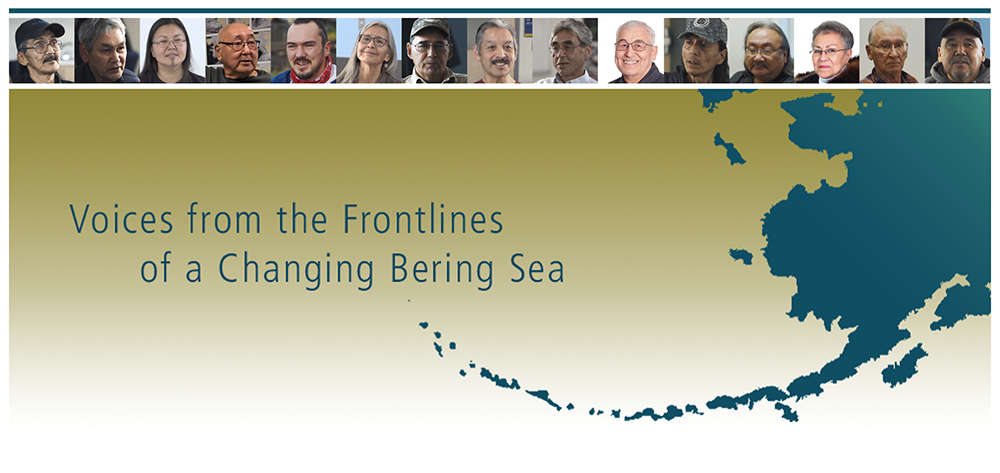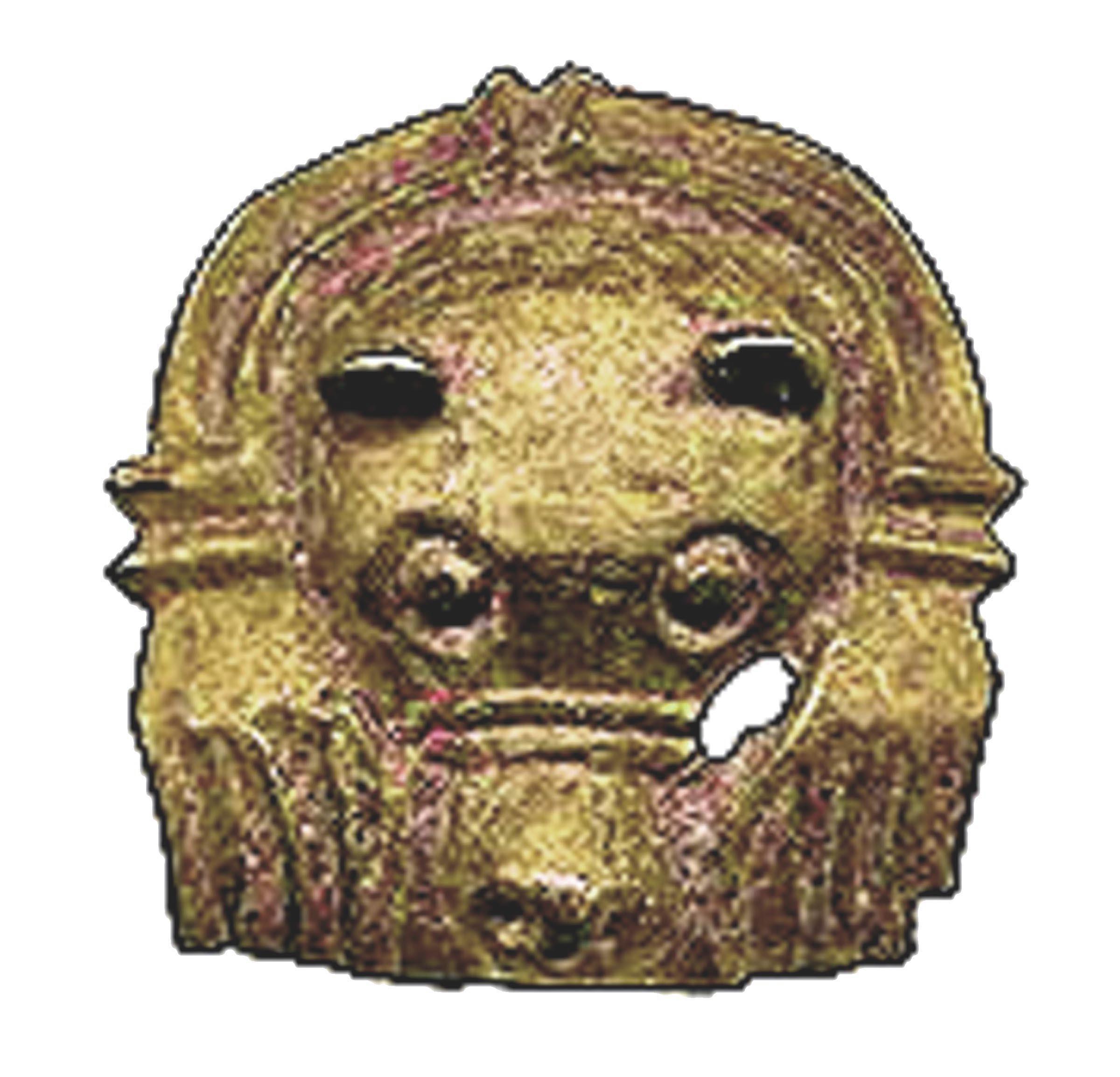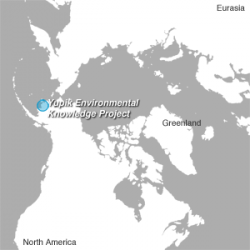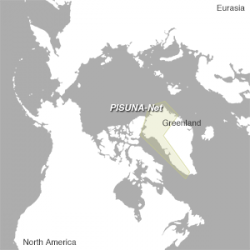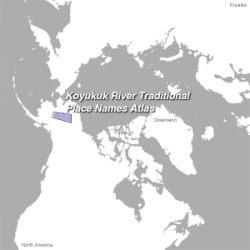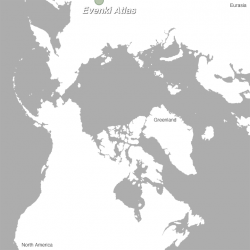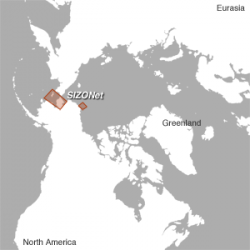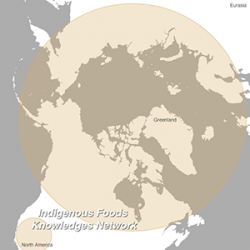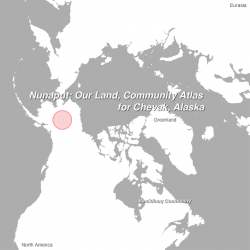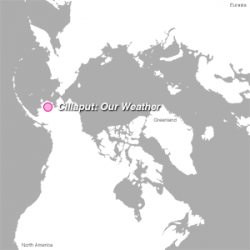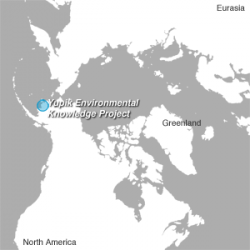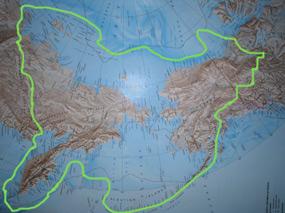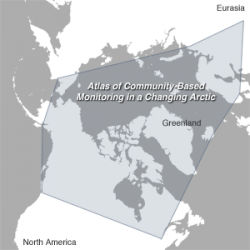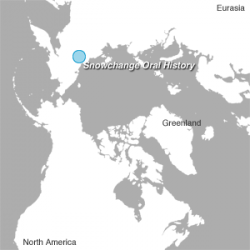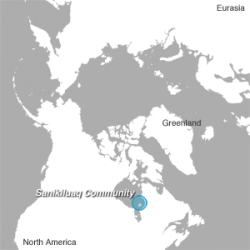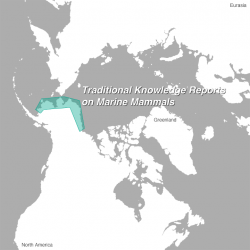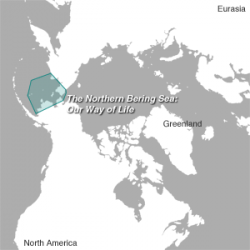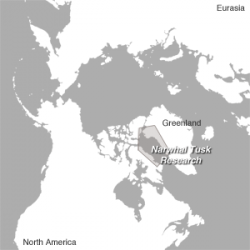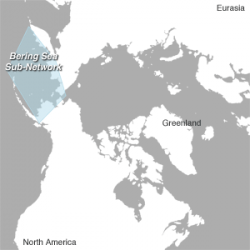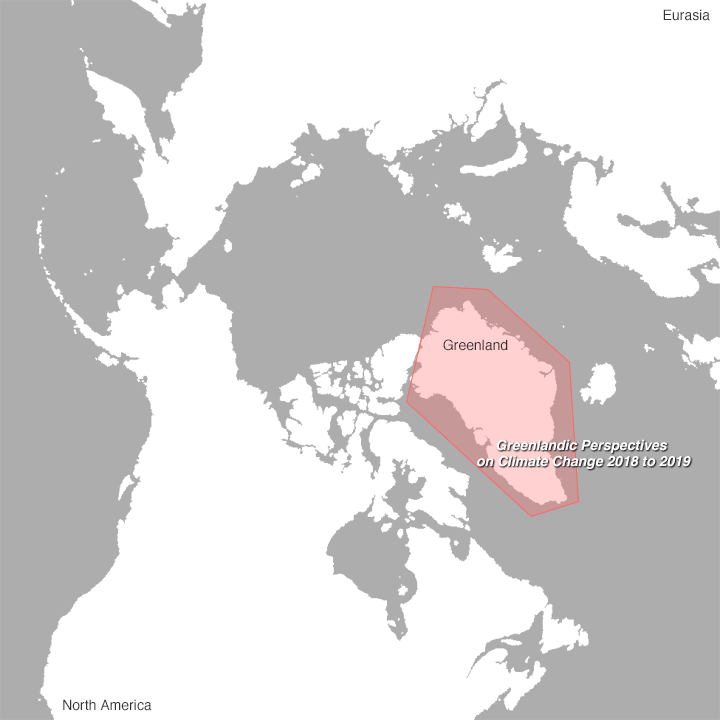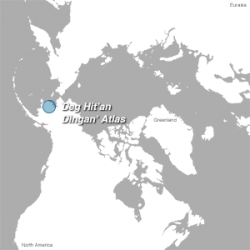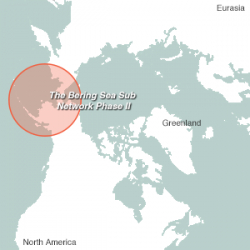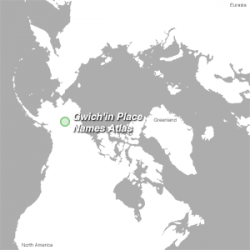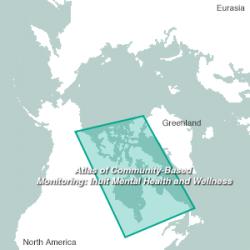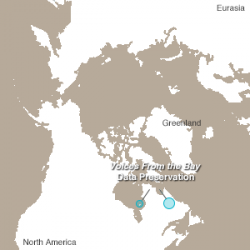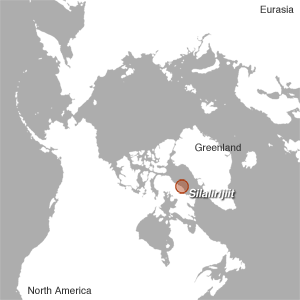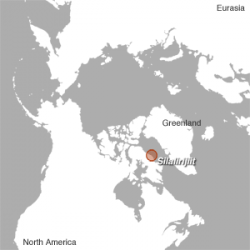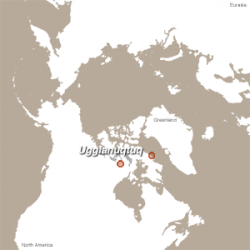Collection
2019 - Ongoing
The Bering Sea is home to over 70 Indigenous communities of the Iñupiat, Central Yup’ik, Cup’ik, St. Lawrence Island Yupik, Unangan, and Chukchi Peoples. In recent years, the Bering Sea has experienced unprecedented declines in sea ice, threatening community food security, infrastructure, and travel. In winters 2018 and 2019, sea ice coverage was by far the lowest observed in at least the last 160 years. Such loss of ice, together with increasing air temperatures and recent winter storm… Read More
Topics: Wildlife observations, Weather, Marine conditions, Infrastructure and development impacts, Indigenous knowledge, Stories, Food security and sovereignty
Geographic Area: Alaska
Status: Ongoing
Collection
1995 - Ongoing
For centuries, Indigenous peoples across Eurasia and North American have maintained harmonious relations with bears with whom they share the world, honoring this relationship through elaborate ceremonies. At present, this website describes the bear ceremonies of Siberian people, the Mansi and the Khanty, through a rich narrative illustrated by photos, videos, and audio recordings. The content is in both English and Russian.
In 2021-2022, the research project aims to reach out to Native… Read More
Topics: Wildlife observations, Indigenous knowledge, Oral history, Stories
Geographic Area: Russian Federation
Status: Ongoing
Collection
2000 - Ongoing
Since 2000, the Calista Elders Council (CEC) staff has worked with elders from Bering Sea coastal communities to document Yup'ik place names. Elders have been eager to teach young people their rich history and named places of their homeland, including camp and settlement sites, rivers, sloughs, rocks, ponds, even sandbars and underwater channels. More than 3,000 names have been identified with Yup'ik views on the importance of place names, the land, values, and language.
Supporting Yup’ik… Read More
Topics: Community-based monitoring, Environmental features & use, Place names, Indigenous knowledge, Oral history, Stories, Youth involvement
Geographic Area: United States, Alaska
Status: Ongoing
Observation Platform
2009 - Ongoing
Building from the development of the Alaska Arctic Observatory & Knowledge Hub (AAOKH) community observations platform, the PISUNA-Net observations database was developed to record, archive, and share Indigenous and local knowledge and expertise on natural resources and resource use on the western and northern coasts of Greenland. Observations begin in May 2009 through the present.
Topics: Community-based monitoring, Wildlife observations, Marine mammals, Fish, Birds, Wildlife management & animal husbandry, Reindeer herding, Indigenous knowledge, Food security and sovereignty
Geographic Area: Greenland
Status: Ongoing
Atlas
ELOKA has developed an online atlas with the goal to collect and preserve the rich knowledge and culture of the Koyukon people of Alaska and the traditional place names and subsistence use areas along the Koyukuk River from the villages of Koyukuk, Huslia, and Hughes.
Topics: Environmental features & use, Place names, Indigenous knowledge
Geographic Area: United States, Alaska
Status: Ongoing
Atlas
2004 - Ongoing
This Atlas focuses on sharing the knowledge, wisdom, and culture of one of the Indigenous Nations of Siberia, Russian Federation, the Evenki, who live in Iyengra, Russia, and the surrounding taiga.
Topics: Wildlife management & animal husbandry, Reindeer herding, Environmental features & use, Place names, Indigenous knowledge
Geographic Area: Russian Federation
Status: Ongoing
Observation Platform
2006 - Ongoing
This data set contains observations of sea ice, weather, and wildlife collected by Indigenous Inupiaq and Yup'ik sea ice experts in several communities along the northern and western coasts of Alaska, beginning in 2006. This information is generously shared with the public by the observers and the communities within which the observers reside.
Topics: Community-based monitoring, Wildlife observations, Marine mammals, Fish, Birds, Weather, Environmental features & use, Trails, Place names, Marine conditions, Polynyas, Sea ice, Ocean currents, Indigenous knowledge
Geographic Area: United States, Alaska
Status: Ongoing
Collection
2017 - Ongoing
The Indigenous Foods Knowledges Network is interested in ethically collecting, sharing, accessing, and visualizing data and documented Indigenous Knowledge to address food sovereignty. The core network members are Indigenous people, supported by researchers with a similar vision. They focus on two regions—the Arctic and the US Southwest—to broaden perspectives and build collaborations to offer personal experiences for food sovereignty in these regions.
Topics: Indigenous knowledge, Health, Food security and sovereignty
Geographic Area: Canada, Nunavut, Circumpolar region, Greenland, Russian Federation, Southwestern United States, United States, Alaska
Status: Ongoing
Atlas
2017 - Ongoing
The Nunaput Atlas is a community-driven, interactive, online atlas for the Chevak (Alaska) Traditional Council and Chevak community members to create a record of observations, knowledge, and to share stories about their land. The Nunaput Atlas is being developed in collaboration with the community and the US Geological Survey.
Topics: Community-based monitoring, Plants, Environmental features & use, Place names
Geographic Area: United States, Alaska
Status: Ongoing
Observation Platform
2017 - Ongoing
Cillaput: Our Weather provides access to current weather conditions in the villages of Chevak and Kotlik located in the Yukon-Kuskokwim Delta region of western Alaska. Measurements include air temperature, humidity, wind speed, snow depth, rainfall, solar radiation, and soil and surface temperatures. The weather stations were established in November 2017 and are running continuously.
Topics: Weather
Geographic Area: United States, Alaska
Status: Ongoing
Atlas
2000 - Ongoing
Since 2000, Calista Education and Culture (CEC) has worked with elders from the Alaskan communities of Kotlik, Emmonak, Alakanuk, Nunam Iqua, Newtok, Tununak, Toksook Bay, Nightmute, Chefornak, Kwigillingok, and Kongiganak to document Yup'ik place names. This work was initiated and encouraged by CEC's Board of Elders as well as community members and funded by the National Science Foundation. Elders showed a strong desire to teach young people the rich history and named places of their homeland… Read More
Topics: Community-based monitoring, Environmental features & use, Place names, Indigenous knowledge, Oral history, Stories, Youth involvement
Geographic Area: United States, Alaska
Status: Ongoing
Collection
2013 - 2022
This site discusses traditional ways people in Western Alaska and Chukotka, Russia, use plants for food medicine and other purposes.
Beringia is the region including the Bering Strait and the land on either side of it. Some people define the term narrowly to include only the westernmost part of the Seward Peninsula in Alaska and the easternmost part of the Chukotsky Peninsula in Russia. However, we prefer a broader definition that includes much of Alaska and Chukotka.
Ethnobotany is the study… Read More
Topics: Plants, Indigenous knowledge, Food security and sovereignty
Geographic Area: Circumpolar region, Russian Federation, Alaska
Status: Complete
Atlas
2013 - 2016
This atlas showcases Arctic communities actively involved in observing social and environmental change. It was designed to highlight the many community-based monitoring (CBM) and traditional knowledge (TK) initiatives across the circumpolar region.
Topics: Environmental features & use, Trails, Place names, Indigenous knowledge, Health, Food security and sovereignty
Geographic Area: Canada, Nunavut, Circumpolar region, Greenland, Russian Federation, United States, Alaska
Status: Complete
Collection
1930 - 2009
Geographic and environmental information from residents of two Indigenous Chukchi communities in the Republic of Sakha-Yakutia, Siberia, Russian Federation, practicing seasonal nomadic reindeer herding and other subsistence activities.
Topics: Wildlife observations, Fish, Wildlife management & animal husbandry, Reindeer herding, Terrestrial conditions, Permafrost, Environmental features & use, Place names, Indigenous knowledge
Geographic Area: Russian Federation
Status: Complete
Collection
1970 - 2010
Hunters describe their observations of sea ice conditions around the Belcher Islands gathered from their many hunting expeditions. The local and traditional knowledge (LTK) gathered from these interviews reveals that the ice is changing and becoming more dangerous and less predictable than it once was.
Topics: Marine conditions, Polynyas, Sea ice, Ocean currents
Geographic Area: Canada, Nunavut
Status: Complete
Report
2007 - 2017
These reports, compiled from a series of related projects, are based on interviews held between 2007 and 2017 with Alaska Native hunters in coastal communities. The reports focus on marine mammals, with emphasis on changes in particular species during the decade of the conducted interviews. This collection is unusual in that it spans both a decade and a large geographic range of communities. The reports, as well as the results of the projects, were also presented in two peer-reviewed papers in… Read More
Topics: Wildlife observations, Marine mammals, Environmental features & use, Food security and sovereignty
Geographic Area: United States, Alaska
Status: Complete
Collection
2011
The purpose of The Northern Bering Sea: Our Way of Life is to show extensive areas where Alaska Native hunters and local fishermen harvest ocean resources, and the marine waters important to the resources we rely on. It illustrates that the whole northern Bering Sea is the storehouse that supports our way of life.
Topics: Community-based monitoring, Wildlife observations, Marine mammals, Fish, Birds, Environmental features & use, Marine conditions, Sea ice, Indigenous knowledge, Food security and sovereignty
Geographic Area: United States, Alaska
Status: Complete
Collection
2003
High Arctic communities in Nunavut, Canada, and in Northwestern Greenland have long been familiar with narwhals. For centuries, the narwhal has been part of the Inuit diet, providing food and nourishment. Although the Arctic is home to many unique animals, it is the narwhal's long, protruding tusk that has inspired legends and stumped scientists for centuries. Scientists have partnered with various Arctic communities to understand the purpose of the narwhal’s tusk. By combining scientific… Read More
Topics: Community-based monitoring, Wildlife observations, Marine mammals, Indigenous knowledge
Geographic Area: Canada, Nunavut, Greenland
Status: Complete
Report
2008 - 2009
The Bering Sea Sub-Network (BSSN) is comprised of a set of coastal communities representing six indigenous cultures: three in the Russian Federation and three in the United States. The objective of BSSN is to develop a framework that will enable residents in remote Arctic communities to systematically document physical and social changes occurring in their region. In 2008 and 2009, approximately 300 hunters and fishermen participated a pilot project of harvest surveys covering species caught,… Read More
Topics: Community-based monitoring, Wildlife observations, Marine mammals, Fish, Birds, Wildlife management & animal husbandry, Environmental features & use, Marine conditions, Sea ice, Indigenous knowledge, Food security and sovereignty
Geographic Area: Russian Federation, United States, Alaska
Status: Complete
Report
2018 - 2019
The Greenlandic Perspectives on Climate Change Survey report provides the first national estimates of residents’ climate change beliefs, experiences, risk-opportunity perceptions and emotional responses, as well as views on recent sea ice changes, glacial changes, climate change impacts, societal adaptation, and climate and environment policy preferences.
From July 2018 to January 2019, an international team of Greenlandic, American, Swedish and Danish researchers from the University of… Read More
Topics: Wildlife observations, Weather, Environmental features & use, Marine conditions, Health, Governance, Food security and sovereignty
Geographic Area: Greenland
Status: Complete
Atlas
Coordinating with the Anvik Tribal Council, Deloy Ges, Inc., Alaska Native Place Name Project, and the University of Alaska Fairbanks (UAF) Community Partnerships for Self-Reliance, ELOKA is developing a place names atlas of the Anvik community's traditional territories. The goal of this project is to work collectively to reconstruct Deg Xinag place names using online mapping and media tools that combine maps, audio recordings, video, photos, and stories.
Topics: Environmental features & use, Place names
Geographic Area: Alaska
Status: Not Released to Public
Collection
The Bering Sea Sub Network is a collaborative alliance of fishers and hunters from coastal villages around the Bering Sea and researchers formed to enable a systematic collection of local observations of physical, biological, and socioeconomic conditions in their regions. ELOKA is developing a system to ingest and manage these sensitive data with a structure designed to allow user-based controlled access.
Topics: Community-based monitoring, Wildlife observations, Wildlife management & animal husbandry, Indigenous knowledge
Geographic Area: Russian Federation, United States, Alaska
Status: Not Released to Public
Atlas
Gwich’in Nąįį Googindì’ K’ìt / Gwich’in Place Names Atlas is a project that has developed an interactive, online Atlas of Gwich’in place names and stories. Working with Gwich’in communities and partners, ELOKA is developing the atlas so that knowledge of the land passed from generation to generation can be preserved and shared.
This atlas is not released to the public; however, interested parties may request access by emailing User Services at eloka@nsidc.org.
Topics Traditional place names,… Read More
Status: Not Released to Public
Atlas
2012 - 2015
This module of the Atlas of Community-Based Monitoring in a Changing Arctic (ArcticCBM) offers an inventory of programs that focus on Inuit mental health and wellness across the circumpolar region. It is based on programs identified by the Inuit Circumpolar Council Canada (ICC-Canada) in its Circumpolar Inuit Health Priorities: Best Health Practices and Research report (2012), as well as additional mental health and wellness programs identified in 2014 and 2015.
Topics: Health
Geographic Area: Canada, Nunavut
Status: Not Released to Public
Collection
Published in 1997, Voices from the Bay: Traditional Ecological Knowledge of Inuit and Cree in the Hudson Bay Bioregion was a ground-breaking publication that documented the traditional ecological knowledge, concerns, and visions of the local Inuit and Cree. The book has a number of sections that include narrative, images, diagrams, and maps. Much of this material was created using digital technology such as word processors and indexing systems, image scanning, and Geographic Information Systems… Read More
Topics: Community-based monitoring, Wildlife observations, Indigenous knowledge
Geographic Area: Canada, Nunavut
Status: Archived
Collection
2009 - Ongoing
Clyde River (Kangiqtugaapik), Nunavut, is located on the east coast of Baffin Island. Starting in 2009, local hunters and Elders partnered with researchers from the University of Colorado Boulder and Colorado State University to initiate the Silalirijiit Project.
An Inuktitut word, Silalirijiit (pronounced see-lah-LEE-ree-yeet) means "those who work with or think about weather." This project links Inuit knowledge with climate science and environmental modeling to understand weather patterns… Read More
Topics: Community-based monitoring, Weather
Geographic Area: Canada, Nunavut
Status: Archived
Observation Platform
2009 - Ongoing
Clyde River (Kangiqtugaapik) is located on the east coast of Baffin Island, Nunavut. Starting in 2009, local hunters and Elders partnered with researchers from the University of Colorado Boulder and Colorado State University to initiate the Silalirijiit Project.
An Inuktitut word, silalirijiit (pronounced see-lah-LEE-ree-yeet) means "those who work with weather." This project facilitates collaboration and knowledge exchange between Inuit experts, visiting scientists, hunters, Elders, and youth… Read More
Topics: Weather
Geographic Area: Canada, Nunavut
Status: Archived
Observation Platform
1920 - 2001
In this interactive, multi-media CD-ROM, Inuit from two Inuit communities in Nunavut, Canada, share their observations and perspectives on recent environmental changes. This CD-ROM is no longer available for distribution.
Topics: Community-based monitoring, Wildlife observations, Weather, Terrestrial conditions, Marine conditions, Sea ice, Ocean currents, Indigenous knowledge, Oral history, Stories
Geographic Area: Canada, Nunavut
Status: Archived


